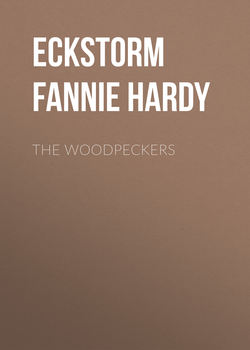Читать книгу The Woodpeckers - Eckstorm Fannie Hardy - Страница 4
III
HOW THE WOODPECKER COURTS HIS MATE
ОглавлениеOther birds woo their mates with songs, but the woodpecker has no voice for singing. He cannot pour out his soul in melody and tell his love his devotion in music. How do songless birds express their emotions? Some by grotesque actions and oglings, as the horned owl, and some by frantic dances, as the sharp-tailed grouse, woo and win their mates; but the amorous woodpecker, not excepting the flickers, which also woo by gestures, whacks a piece of seasoned timber, and rattles off interminable messages according to the signal code set down for woodpeckers’ love affairs. He is the only instrumental performer among the birds; for the ruffed grouse, though he drums, has no drum.
There is no cheerier spring sound, in our belated Northern season, than the quick, melodious rappings of the sapsucker from some dead ash limb high above the meadow. It is the best performance of its kind: he knows the capabilities of his instrument, and gets out of it all the music there is in it. Most if not all woodpeckers drum occasionally, but drumming is the special accomplishment of the sapsucker. He is easily first. In Maine, where they are abundant, they make the woods in springtime resound with their continual rapping. Early in April, before the trees are green with leaf, or the pussy-willows have lost their silky plumpness, when the early round-leafed yellow violet is cuddling among the brown, dead leaves, I hear the yellow-bellied sapsucker along the borders of the trout stream that winds down between the mountains. The dead branch of an elm-tree is his favorite perch, and there, elevated high above all the lower growth, he sits rolling forth a flood of sound like the tremolo of a great organ. Now he plays staccato, – detached, clear notes; and now, accelerating his time, he dashes through a few bars of impetuous hammerings. The woods reëcho with it; the mountains give it faintly back. Beneath him the ruffed grouse paces back and forth on his favorite mossy log before he raises the palpitating whirr of his drumming. A chickadee digging in a rotten limb pauses to spit out a mouthful of punky wood and the brown Vanessa, edged with yellow, first butterfly of the season, flutters by on rustling wings. So spring arrives in Maine, ushered in by the reveille of the sapsucker.
So ambitious is the sapsucker of the excellence of his performance that no instrument but the best will satisfy him. He is always experimenting, and will change his anvil for another as soon as he discovers one of superior resonance. They say he tries the tin pails of the maple-sugar makers to see if these will not give him a clearer note; that he drums on tin roofs and waterspouts till he loosens the solder and they come tumbling down. But usually he finds nothing so near his liking as a hard-wood branch, dead and barkless, the drier, the harder, the thinner, the finer grained, so much the better for his uses.
Deficient as they are in voice, the woodpeckers do not lack a musical ear. Mr. Burroughs tells us that a downy woodpecker of his acquaintance used to change his key by tapping on a knot an inch or two from his usual drumming place, thereby obtaining a higher note. Alternating between the two places, he gave to his music the charm of greater variety. The woodpeckers very quickly discover the superior conductivity of metals. In parts of the country where woodpeckers are more abundant than good drumming trees, a tin roof proves an almost irresistible attraction. A lightning-rod will sometimes draw them farther than it would an electric bolt; and a telegraph pole, with its tinkling glasses and ringing wires, gives them great satisfaction. If men did not put their singing poles in such public places, their music would be much more popular with the woodpeckers; but even now the birds often venture on the dangerous pastime and hammer you out a concord of sweet sounds from the mellow wood-notes, the clear peal of the glass, and the ringing overtones of the wires.
The flicker often telegraphs his love by tapping either on a forest tree or on some loose board of a barn or outhouse; but he has other ways of courting his lady. On fine spring mornings, late in April, I have seen them on a horizontal bough, the lady sitting quietly while her lover tried to win her approval by strange antics. Quite often there are two males displaying their charms in open rivalry, but once I saw them when the field was clear. If fine clothes made a gentleman, this brave wooer would have been first in all the land: for his golden wings and tail showed their glittering under side as he spread them; his scarlet headdress glowed like fire; his rump was radiantly white, not to speak of the jetty black of his other ornaments and the beautiful ground-colors of his body. He danced before his lady, showing her all these beauties, and perhaps boasting a little of his own good looks, though she was no less beautiful. He spread his wings and tail for her inspection; he bowed, to show his red crescent; he bridled, he stepped forward and back and sidewise with deep bows to his mistress, coaxing her with the mellowest and most enticing co-wee-tucks, which no doubt in his language meant “Oh, promise me,” laughing now and then his jovial wick-a-wick-a-wick-a-wick-a, either in glee or nervousness. It was all so very silly – and so very nice! I wonder how it all came out. Did she promise him? Or did she find a gayer suitor?
